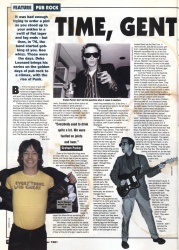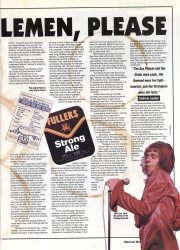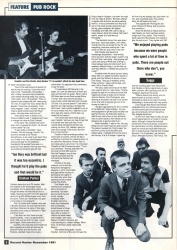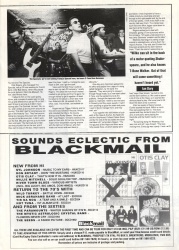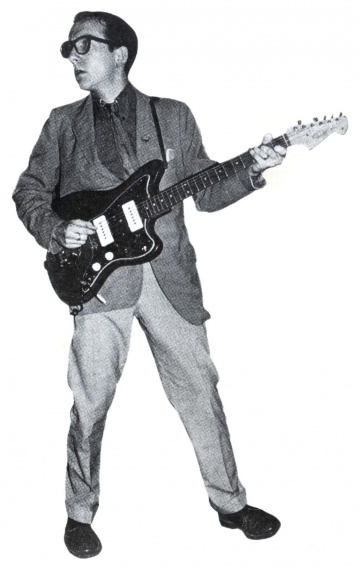|
It was bad enough trying to order a pint as you stood up to your ankles in a swill of flat lager and fag ends — but then, in '76, the band started gobbing at you. Gee whizz. Those were the days. Deke Leonard brings his series on the golden days of pub rock to a climax, with the rise of Punk.
By '76 the first wave of pub rock bands had either broken up or moved on to bigger things. Dr Feelgood were conquering America and apart from Graham Parker and the Rumour and Rockpile, there was little attracting press or record company interest.
Parker and the Rumour were already moving on to bigger venues like the Rainbow and Hammersmith Odeon. "I loved the big places," says Parker, "because I'd always had an incredible problem with monitor systems in the pubs. I hadn't had the background of playing different kinds of places like the Rumour had. My singing style was pretty much go out there and scream at the fuckers. Ram it down their throats. For some reason I was angry and for some reason, whether it was all the things they'd been through in their time, The Rumour were all energy and anger. It was a bit nasty. Everybody used to drink quite a lot. We were fuelled on joints and beer. I couldn't get stoned and do a gig now but in those days you were supposed to. It was just part of it. I haven't reformed; I just don't have a drink before I sing now. I'm half-reformed. Once a week I eat brown rice and vegetables."
Down at the Nashville things were turning a little sour. To supply the pub with bands, Dai Davies had formed an agency called Savage Aries, with Derek Savage, an old friend and business associate, and was soon representing Meal Ticket, Frankie Miller, Deaf School and the Flaming Groovies. They built a circuit within a circuit and began bringing in out-of-town bands in for a week or so.
However, the Nashville was a Fullers' pub and Fullers were not happy. They were footing the bill and began to regard the Nashville as something of a fiscal black hole, and the large crowds as a collection of potential trouble-makers.
"We always made sure that the bands had a good time," says Davies, "but Fullers didn't see it that way. I had to force it onto the contract that bands had to have a crate of beer at the end of a gig. It seems such a small thing nowadays but, at the time, it was a very generous gesture, but all these things I had to fight for."
The constant battle was tiresome and Davies, who hadn't handled a band since the demise of Ducks Deluxe and Brinsley Schwarz, toyed with moving back into management. A year or so earlier he had, by chance, seen a band called the Stranglers.
"I thought they were interesting but really bad," says Davies. "They hadn't got it together as a live band. They came into the agency a few weeks later and we said, 'You need to improve a bit musically. Go away and do every gig you can for a year or so.' And that's what they did. Nine months later they rang up and said they'd done all these gigs and they'd had a couple of line-up changes and they were much better. We went to see them again. I thought they were a cross between the Velvet Underground and the Doors. I thought of it as almost the psychedelic revival arrived early. We signed them to the agency, put them round the circuit, and, eventually, we started to manage them."
One day Malcolm McLaren rang up Davies and invited him to come and see his new band, the Sex Pistols. "They were playing at what must have been the first warehouse party, down in the docks somewhere," recalls Davies. I went, and they were great. I just thought I was seeing an English band that was copying Iggy and the Stooges. I'd been heavily involved with Iggy in the past as his publicist and, on the strength of that, I booked them into the Red Cow, in Hammersmith, and did the process with them, graduating them to the Nashville. Malcolm has written this out of the Sex Pistols' history. He prefers the notion that no venue would take the risk of putting them on, but we put them on in all our venues. Malcolm has always been a very personable, nice guy. It's only in the press he pretends to be sinister. He used to come quite regularly to Brinsley Schwarz gigs; probably not a thing he'd admit to."
"I put the Pistols on at the Nashville with the 101ers as a double bill," says Davies. "They did about eight or nine weeks. Nothing outrageous happened. Loads of people came to see them. They were a younger crowd than usual and a little more boisterous, but nothing special. Ordinary kids would come in once or twice and the next week they'd come in with a funny haircut, because they'd decided to go for it. One girl used to come and see Graham Parker. She was about nineteen, obviously well off, and dressed in smart clothes, and she turned into a punk over the eight weeks that the Pistols were there. The smart clothes went, she bought a motor-bike, and her accent switched down to Fulham. She seemed fairly typical.
"There was no trouble until the very last week," remembers Davies. "They staged a rather phoney fight and there was a journalist there to take a photo of it. It wasn't a real fight. We'd had much worse than that. Drag nights were worse than that. Brian, the doorman, who was the best at his job I've ever seen, didn't even notice it. But when it was in the papers, Fullers rang me up, completely outraged. The papers had rung them up and they said, 'We're certainly not having them back, or any bands like them'. The papers rang me and I said, 'It was nothing. They can play here any time they like.' We carried on putting punk bands on, but we had to pretend they weren't punk bands. We had to pretend that the Damned weren't punk. It was certainly a myth that the Sex Pistols were banned from every venue in London. They progressed quite normally through the Fullers' chain. It was their last night at the Nashville, not because of the fight, but because we could not longer afford to book them. They were too big."
The Sex Pistols, however, didn't get past the door at the Hope & Anchor. They sent down their representative, Bernie Rhodes, to fix up a gig. "He was a little turd," says John Eichler, the landlord. "He laid this really obnoxious trip on us about how the Sex Pistols were going to be the next big thing, so I physically threw him out."
Eichler had just taken over the Hope after the previous landlord, Fred Grainger, a dedicated hedonist, had quit to pursue his grandiose dreams.
Eichler was an old colleague of both Dai Davies and Dave Robinson of Stiff Records. He had been one of the protagonists in the Brinsley Schwarz hype' and went on to manage Help Yourself, a United Artists' band who were a refuge for several wayward Ducks Deluxers, and was a member of what was fondly referred to as the UA Mafia who treated Andrew Lauder's A&R office as their own, while Lauder looked on benignly.
Eichler went to see Davies and Savage and together they decided to take over the tenancy of the Hope. Davies and Savage provided the money and Eichler proceeded to rtaVffie pub as he damned well pleased. It's alrbaOy formidable reputation was enhanced by an idiosyncratic booking policy (bands were booked for the most whimsical of reasons), a colourful staff (space cadets and out-of-work actors), and an open-house policy that made the pub the last stop for musicians who had run out of places in which to lig and needed somewhere to crash. Rat Scabies, of the Damned, spent many a night there.
"The Captain and I would go out and, when everywhere else had shut down, it was, 'Let's go down the Hope,' says Scabies. "There was a big room with beds in it. It was like a dormitory for well-dodgy musicians. I remember Jean-Jaques Burnell waking up one morning and doing his karate exercises, and we were all going, 'Aw, fuck off, Burnell'."
For The Damned, getting on the pub circuit wasn't easy, even if they got past the front door.
"We played the Nashville once," recalls Scabies, "and they banned us. We never played there again. It was strange because
|
